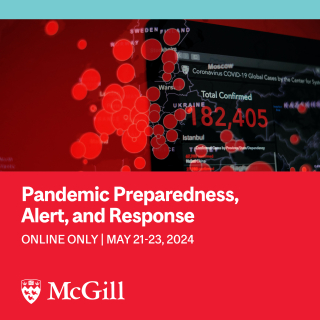Pandemic Preparedness, Alert, and Response | May 21-23, 2024 
“The course showed me the big picture of the pandemic preparedness effort…It helped me see beyond the technicalities of my research, putting light onto the socio-economic-legal-political realities that influence the intensity of the effects of epidemics/pandemic.”
“The lecturers were fantastically qualified experts and I wish I had a way to communicate with them as I was navigating my work in the early days of the pandemic. I also enjoyed learning the perspectives of my peers from other parts of the world.”
-Pandemic Preparedness course participants
COURSE FORMAT
Online only. Course will be live approximately 9:00am-1:00pm (Montreal time) each day May 21-23, 2024. Live content will be recorded and available until July 1, 2024.
DESCRIPTION
This course will offer a deep dive into the multifaceted world of pandemics, emphasizing their origins, biology, and the intricate dynamics of their emergence and spread. It provides a holistic overview of global systems designed for pandemic prevention, preparedness, and management, while also spotlighting the imminent policy dialogues at the World Health Assembly, aimed at revising the International Health Regulations (IHR) and formulating a groundbreaking legal framework on pandemics. Participants will gain insight into epidemiology, public health and global health, delve into critical policies being currently negotiated and participate in joint learning of future opportunities and threats for global health while learning from experts and leaders in the respected fields.
DIRECTORS
Yassen Tcholakov, MD MSc MIH
Assistant Professor, Department of Epidemiology, Biostatistics, and Occupational Health, McGill University
Clinical Lead in Infectious Diseases, Nunavik Department of Public Health
Chen Liang, PhD
Professor, Department of Medicine, McGill University
Director, McGill Centre for Viral Diseases
PREVIOUS COURSE FACULTY
- Ruchir Agarwal, Research Fellow at the Harvard Kennedy School, Executive Fellow at Yale School of Management, and Co-Founder of the Global Talent Lab
- David S. Barnes, Associate Professor of History and Sociology of Science at the University of Pennsylvania
- Sylvie Briand, Director of the Epidemic and Pandemic Preparedness and Prevention Department at WHO
- Rachael Crockett, Policy Advocacy Manager at Drugs for Neglected Diseases initiative (DNDi)
- Minnie Grey, Immediate past Executive Director of the Nunavik Regional Board of Health and Social Services; President of MKL Consulting Inc.
- Roojin Habibi, Pierre Elliott Trudeau Foundation Scholar & Assistant Professor of Law (incoming), Common Law Section, Faculty of Law, University of Ottawa
- Adam Houston, Medical Policy & Advocacy Officer at MSF Canada
- Yuanqiong Hu, Senior Legal and Policy Advisor at MSF Access Campaign
- Marion Koopmans, Director of the WHO Collaborating Centre for Arbovirus and Haemorrhapic Fever Reference and Research
- Jessica E. Manning, Director, NIAID International Center of Excellence in Research Cambodia
- Sangeeta Shashikant, Coordinator Development & IP Programme at the Third World Network
- Maria Van Kerkhove, Head of the Emerging Diseases and Zoonoses Unit at WHO
The faculty for the 2024 course will be confirmed at a later point in time.
CONTENT
Pandemics, as starkly demonstrated by the COVID-19 pandemic, have the profound ability to reshape societies and deeply affect human health. This year's course aims to enhance understanding of pandemics by delving into their origins and dissecting multidisciplinary approaches for their prevention and management, encompassing fields like biology, epidemiology, public health, and clinical medicine. Key discussions will revolve around global systems, scrutinizing how they can either advance or impede global equity, especially concerning access to essential countermeasures. Further, we will probe into the intricate link between human and animal health and discuss the One Health approach and the paramount importance of epidemic intelligence including diverse sources of surveillance data including animal disease surveillance. Participants will engage in a foresight exercise using collective intelligence to explore possible futures to identify trends, key factors, and emerging issues related to pandemics. Concluding the course, participants will be privy to in-depth discussions and dialogue with key policymakers who are at the center of health negotiations that will happen the subsequent week in Geneva at the World Health Assembly, where the anticipated adoption of the Pandemic Treaty and amendments to the International Health Regulations (IHR) will set the stage for future pandemic preparedness and response.
OBJECTIVES
By the end of the course, participants will be able to:
- Discuss the concept of One Health and explain infectious disease emergence, the origins of pandemics and disease characteristics which are associated with pandemic potential
- Present the impact of pandemics on social life, mental health, and identify at-risk populations
- Describe the key elements of the global architecture for pandemic preparedness and response including its governance, key systems and sources of financing
- Apply epidemiological concepts to analyze public health measures used to contain and mitigate the impact of pandemics
- Examine epidemic intelligence and integrated disease surveillance including indicator-based surveillance, event based surveillance and the use of surveillance data for public health decision making
- Analyze new policy options for instruments for pandemic preparedness and response
- Participate in foresight exercise using collective intelligence to explore possible futures to identify trends, key factors, and emerging issues related to pandemics
TARGET AUDIENCE
- Public health professionals
- Policy makers and public health implementers
- Community advocates and civil society
- Undergraduate and graduate students
- Researchers and academics involved in pandemic and emerging viruses research
- Funding agencies
- Product development partnerships
ENROLMENT
Limited to 100 online participants.

